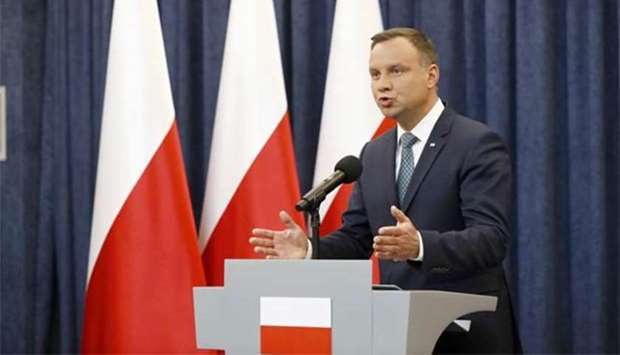* President vetoes two out of three judicial reform bills
* Duda says he backs reform, but not in current form* Reforms criticised by EU and US
* PiS MP says "we may have to wait much longer" for real reform
Polish President Andrzej Duda said on Monday that he would veto two of three bills passed by parliament in a judicial reform that has triggered nationwide street protests and raised EU and US concerns about a politicisation of the courts.
Duda is an ally of the ruling right-wing, eurosceptic Law and Justice party and, although he had threatened to water down one of the bills, his veto of a second bill was a surprise.
"I have decided that I will send back to the Sejm (lower house of parliament) - which means I will veto - the bill on the Supreme Court, as well as the one on the National Council of the Judiciary," Duda said.
The move quickly found favour with foreign investors, boosting the Polish currency, the zloty, around 0.7% against the euro.
On Saturday, the upper house had given final approval to a bill that would remove all current Supreme Court judges immediately except those hand-picked by the justice minister.
Parliament had earlier passed a bill giving it the right to name most of the members of the National Council of the Judiciary, which would nominate future candidates for the president to appoint to the Supreme Court.

People gather in front of the Presidential Palace during a protest in Warsaw
"I'm absolutely a supporter of this reform, but a wise reform," Duda said in a brief live statement. "As president, I feel deep inside my soul that this reform in this form will not increase the sense of security and justice."
The overhaul of the judiciary, coupled with a drive by PiS to expand its powers in other areas, including control of the media, has provoked a crisis in relations with the European Union and sparked one of the biggest political conflicts since Poland overthrew communism in 1989.
For many days, tens of thousands of protesters have been gathering in cities including Warsaw, Krakow and Poznan for candle-lit vigils, demanding that Duda veto the reforms.
The opposition and most legal experts say the changes violate the Polish constitution.
'Reform will have to wait'
But the government has rebutted accusations that it is heading toward authoritarian rule. The PiS says the changes are needed to ensure courts serve all Poles, not just the "elites".
PiS legislator Jacek Sasin said he was surprised by Duda's move.
"I'm afraid the president's decision may mean that we will have to wait much longer for the reform, a real reform of the Polish judiciary, unfortunately," he told the state broadcaster TVP Info.
PiS leader Jaroslaw Kaczynski declined to answer reporters' questions as he headed into a party leadership meeting summoned to discuss the unexpected veto.
The EU executive, the European Commission, on Wednesday gave Poland a week to shelve the reforms, which Brussels says would put courts under direct government control. The United States, Poland's most important ally in Nato, also expressed concern.

